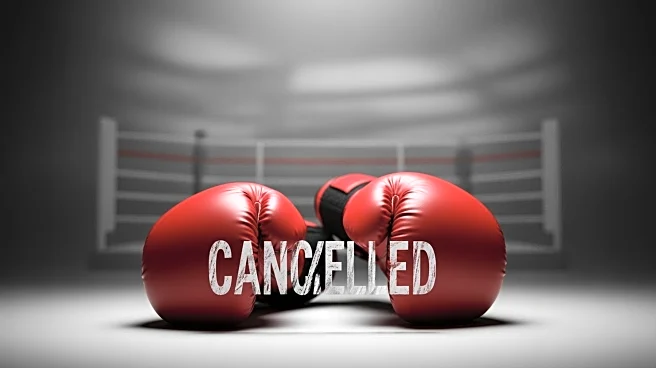What's Happening?
The highly anticipated boxing match between Jake Paul and Gervonta Davis, scheduled for November 14, has been canceled following allegations against Davis. Davis is accused of assaulting a woman in Miami
Gardens, Florida, which has led to a civil lawsuit. The lawsuit claims Davis committed battery, aggravated battery, false imprisonment, kidnapping, and intentional infliction of emotional distress. The incident reportedly occurred at a Miami strip club, and video evidence is said to exist. As a result, Most Valuable Promotions announced that the fight will not proceed, offering refunds to ticket holders. Jake Paul may still fight before the end of the year, but Davis is unlikely to participate.
Why It's Important?
The cancellation of the fight impacts the boxing industry, as it was expected to be one of the most lucrative events in combat sports for 2025. The allegations against Davis highlight ongoing issues of athlete conduct and legal accountability. This development may affect Davis's career and reputation, while Jake Paul must now seek a new opponent, potentially altering his fight schedule and promotional plans. The situation underscores the importance of addressing personal conduct in professional sports and its implications for event planning and athlete partnerships.
What's Next?
With the fight canceled, Jake Paul is exploring alternative opponents, with names like Andre Ward, Anthony Joshua, and Nate Diaz being considered. However, some potential replacements, such as Francis Ngannou, have declined involvement. The legal proceedings against Davis will continue, potentially affecting his future in boxing. Meanwhile, Jake Paul aims to secure a new fight before the year's end, which could involve negotiations with various promoters and fighters to find a suitable replacement.
Beyond the Headlines
The incident raises broader questions about the ethical responsibilities of athletes and the impact of personal behavior on professional opportunities. It also highlights the legal challenges and public scrutiny faced by athletes accused of misconduct. The case may influence how sports organizations handle similar situations in the future, emphasizing the need for clear policies and consequences for off-field behavior.









